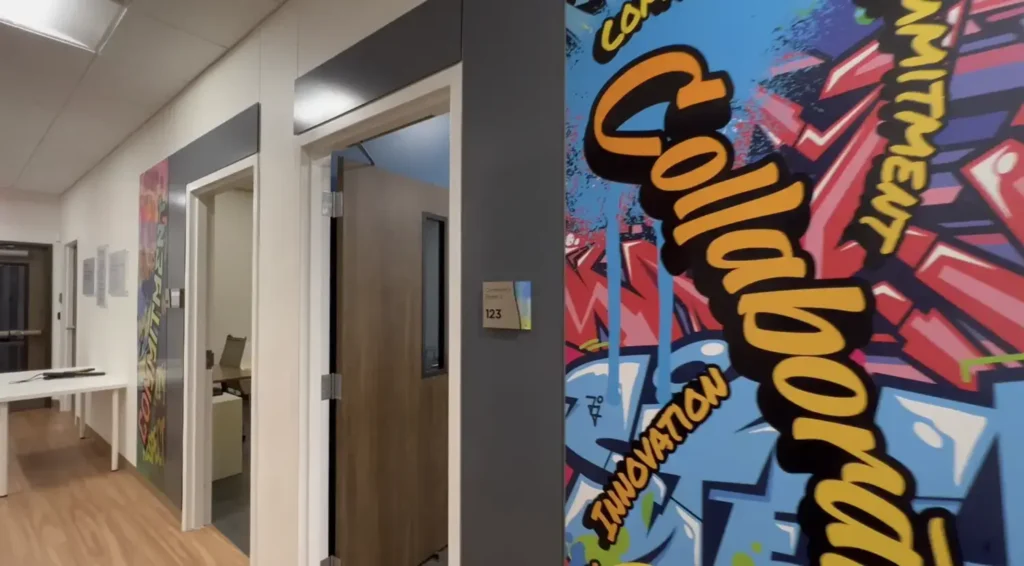Confidential Suicide Ideation Assessment and Testing for Teens & Adolescents in Dallas, Texas
In Texas, approximately 12.2 out of every 100,000 adolescents aged 15-19 die by suicide annually. Suicide prevention has never been more vital, and BasePoint Academy in Dallas, Texas, offers a free adolescent mental health suicide assessment. If you’re concerned for your child, don’t hesitate to call (972) 357-1749 today to schedule this valuable psychological evaluation.
If you or someone you love is struggling with suicidal ideation or self-harm, or if you’re facing an emergency, call 911 or reach out to the Suicide and Crisis Center of North Texas at 214-828-1000 or 800-273-TALK (1-800-273-8255). Everyone’s safety and well-being are priorities.
Schedule a Confidential Mental Health Suicidal Ideation Assessment for Your Teen
If you’re concerned about your teen’s mental health, scheduling a confidential mental health suicidal ideation assessment is crucial. This suicide test for teens involves a comprehensive mental health evaluation, including diagnostic assessment questionnaires and psychological testing, to identify the risk of suicide and other mental health issues. Early intervention can make a significant difference in teenage well-being.
A thorough clinical assessment by a mental health professional will provide insights into your teen’s emotional state, underlying issues, and the best course of action. These mental health evaluation tools ensure that your teen receives the appropriate support and treatment, addressing both immediate concerns and long-term mental health needs.
BasePoint Accepts Insurance for Teen Mental Health
Our free mental health assessment with a licensed clinician will provide you with a recommendation for the appropriate level of care for your teen struggling with their mental health. We can also check your insurance coverage levels.
Call us today to schedule a complimentary same-day assessment at (972) 357-1749 or complete our inquiry form.
Teen Therapy & Treatment Admissions form
Contact BasePoint Academy Today
Contact us today to schedule a free confidential assessment for your teen with a licensed clinician.
You can also get in touch to talk with our mental health experts about treatment needs, care options and your insurance coverage levels.
Call: (972) 357-1749Check Your InsuranceWhat Are Suicide Warning Signs in Teens?
Suicide warning signs in teens often manifest through changes in adolescent behavior, including withdrawal from friends and family, expressions of hopelessness, and increased isolation. Teens may also show signs of depression and desperation or engage in self-destructive behavior, which can be indicators of suicidal thoughts or emotional distress.
Pay attention to these signs, as they can be subtle but significant. A teen expressing feelings of hopelessness, talking about death, or showing a sudden interest in risky behavior may be struggling with severe emotional distress. This could also indicate the presence of one or more psychiatric disorders. It’s crucial to take these behaviors seriously and seek professional help to support teens’ mental health. Contact us for a same-day suicide assessment for teens.
What Is Suicidal Ideation in Teenagers?
Suicidal ideation in teenagers refers to the thoughts or plans of ending their own life. Suicidal tendencies can range from fleeting thoughts to detailed planning. It’s often a response to overwhelming teenage challenges, such as bullying, academic pressure, or family issues, and is a serious sign of the need for immediate support and crisis intervention.
Understanding and addressing the underlying causes of suicidal ideation is essential. Teenage emotions and the challenges of adolescent development can be intense. Without proper support, these overwhelming feelings can lead to dangerous thoughts. If a young person is experiencing suicidal ideation, it’s crucial to seek professional support to ensure their safety and well-being.
Who is at High Risk for Suicide?
Individuals at high risk for suicide often include those struggling with severe mental health disorders, such as depression, anxiety, or substance abuse. Youth, particularly those facing significant life challenges like bullying, family conflicts, or trauma, are especially vulnerable. Early recognition and intervention strategies are crucial in preventing a potential crisis.
Understanding who is at high risk for suicide can help in taking proactive steps to support those in need. Early intervention strategies like counseling, building a solid support network, and fostering open communication can make a significant difference for youth. It’s essential to address warning signs promptly to provide the necessary care and prevent tragedy.

BasePoint Academy Accepts Health Insurance
We accept most major health insurance providers in Texas and can check your treatment coverage levels on your behalf.
Confidential Mental Health Suicide Assessment for My Teen in Dallas-Fort Worth
At BasePoint Academy, our confidential mental health suicide disorder test for teens in Dallas, Texas, provides clarity on mental health symptoms to facilitate the most appropriate, effective care. Our treatment centers in Arlington, Forney, and McKinney offer access to these services alongside expertise in adolescent psychiatry. We also accept a wide range of insurance coverage—call (972) 357-1749 for details.
- Arlington, Texas: 3900 Arlington Highlands Blvd, Suite 237, Arlington, TX 76018
- Forney, Texas: 713 W Broad St, Suite 200, Forney, TX 75126
- Frisco, Texas: 8275 Judges Way, Suite 100I, Frisco, TX 75036
- McKinney, Texas: 4733 Medical Center Drive, McKinney, TX 75069

What To Do if My Teen Threatens Suicide?
If your teen threatens suicide, take it seriously and seek immediate help. Contact a mental health professional, call a crisis hotline, or take them to the nearest emergency room. Ensuring your teen’s safety is the top priority, and early intervention can be life-saving.
In addition to seeking immediate help, create a supportive, non-judgmental environment for your teen to express their feelings. Listen without interrupting, avoid dismissing their emotions, and reassure them that you’re there to help. Working closely with mental health professionals, you can develop a plan to address your teen’s needs and provide ongoing support. Call BasePoint Academy today at (972) 357-1749.

Are Teen Suicide Assessments Confidential and Private?
Yes, teen suicide assessments are confidential and private. When a suicide assessment for adolescents is conducted, mental health professionals adhere to strict confidentiality guidelines to protect your teen’s privacy. The suicidal thought or self harm testing process ensures that sensitive information is only shared with those directly involved in your teen’s care, such as healthcare providers or, in many cases, parents or guardians.
Your teen’s privacy during a mental health assessment interview is upheld and respected. This confidentiality helps create a safe space to express thoughts and feelings openly, allowing professionals to accurately evaluate their psychological needs. Knowing that the process is private can encourage your teen to engage more fully in the assessment, leading to better outcomes.
Contact BasePoint Academy Today
Contact us today to schedule a free confidential assessment for your teen with a licensed clinician.
You can also get in touch to talk with our mental health experts about treatment needs, care options and your insurance coverage levels.
Call: (972) 357-1749Check Your InsuranceHow To Get a Psychiatric Assessment for Suicidal Ideations for an Adolescent in Dallas
To get a psychiatric assessment for suicidal ideations for an adolescent in Dallas, Texas, start by arranging a mental health screening with the professionals at BasePoint Academy. A comprehensive behavioral health assessment for mental disorders can provide a thorough evaluation of your child’s needs.
We provide expert guidance and support throughout this process, and our experienced team can help facilitate the appropriate resources to address your teen’s mental health concerns. Don’t hesitate to call our team for compassionate and confidential assistance.
Can I Schedule a Mental Health Suicide Assessment for My Child or Dependent in Dallas, TX?
Yes, you can schedule a mental health suicide assessment for your child or dependent in Dallas, TX. This mental and emotional wellness assessment is integral to addressing concerns about their psychological well-being and ensuring they receive the support they need. Many facilities that specialize in adolescent care, including BasePoint Academy, offer a suicide test for teens free of charge.
Our admissions process begins with this psychological evaluation. We’ll guide you through the process, providing the standardized mental health assessment tools and resources to effectively evaluate your child’s psychological health. Don’t hesitate to seek support—ensuring your child’s well-being is the top priority.

What Questions Are Expected to Be Asked During an Assessment Screening Process for Suicidal Ideations?
During an assessment screening process for suicidal ideations, mental health professionals will ask a range of questions to understand your child’s thoughts, feelings, and behaviors more deeply. This comprehensive evaluation is designed to gauge the severity of suicidal thoughts, identify underlying issues, and determine the best course of action for treatment.
While the questions may vary from one mental health screening to the next, here are some common questions that might be asked during an assessment of disorders in childhood and adolescence:
“Have you had any thoughts about wanting to harm yourself or end your life?”
- This question assesses the presence and severity of suicidal ideation and gauges the immediate risk level.
“When did you first start having these thoughts?”
- This enables the professional to understand the duration and possible triggers for suicidal thoughts, which can help identify patterns or contributing factors.
“Have you ever made any plans or taken steps towards ending your life?”
- This question determines if there is a specific plan or intent, which can indicate a higher risk level and the need for immediate crisis intervention.
“Are there any particular situations or stressors that seem to increase these thoughts?”
- This question helps identify potential stressors or life events that could be influencing suicidal thoughts, aiding in targeted intervention strategies.
“Do you have access to means to carry out your plans, such as firearms or medications?”
- This is commonly asked to assess the immediate risk and take steps to ensure the safety of the individual by removing or restricting access to means of self-harm.
“How have these thoughts affected your daily life and relationships?”
- This question provides insight into the impact of suicidal ideation on daily functioning and relationships, which can help in planning appropriate support and treatment.
“Have you ever experienced similar thoughts or behaviors in the past?”
- Having an understanding of the history of suicidal ideation or attempts can provide context for current concerns and guide treatment planning.
Who Can Perform Psychological Testing in Dallas, Texas for Teenage Suicidal Ideation?
In Dallas, Texas, psychological testing for teenage suicidal ideation is available through licensed psychologists, psychiatrists, and clinical social workers. These experts, practicing in private offices, mental health clinics, and hospitals, are trained to recognize and address adolescent behavior indicative of suicidal tendencies and underlying mental health concerns.
Additionally, specialized counseling centers and child and adolescent mental health services offer these evaluations using a multidisciplinary team approach. School psychologists or counselors can provide initial screenings and connect you with community resources for further support. Engaging with a qualified professional who focuses on teens’ mental health ensures that your child receives targeted care to effectively manage suicidal ideation and self-destructive behavior.
Can I Expect Any Addiction-related Questions During the Suicide Assessment?
During a suicide assessment for your teen, addiction-related questions may be asked. These questions help the mental health professional gain a comprehensive understanding of your child’s overall well-being and identify any co-occurring issues that may impact their mental health. Here are some example questions you might encounter:
Has your teen ever used substances like alcohol, drugs, or prescription medications?
This question helps assess if substance use is a factor contributing to your teen’s emotional distress or suicidal thoughts.
Does your child use substances to cope with stress or emotional pain?
This can indicate if your teen is using substances as a coping mechanism, which can increase the risk of harmful behaviors.
Have you noticed any changes in your teen’s behavior, such as withdrawal from activities or friends?
Substance use can lead to behavioral changes, and this question helps identify if addiction might be affecting your teen’s social and emotional life.
Has your teen experienced any legal or school-related issues due to substance use?
This question aims to understand the broader impact of substance use on your teen’s life, which could be a factor in their mental health struggles.
These questions may vary depending on your teen’s circumstances. It’s essential to provide as much detailed information as possible during the assessment to ensure an accurate psychological evaluation. If your teen has struggled with any mental health issues or substance use, make sure to raise these concerns during the assessment. This transparency will help the mental health professional create an effective, personalized treatment plan for your child.
Contact BasePoint Academy Today
Contact us today to schedule a free confidential assessment for your teen with a licensed clinician.
You can also get in touch to talk with our mental health experts about treatment needs, care options and your insurance coverage levels.
Call: (972) 357-1749Check Your InsuranceWhen Is the Best Time to Schedule A Suicide Assessment at BasePoint?
If you’re concerned about your child’s mental health, reach out to BasePoint Academy as soon as possible. We’re open seven days a week, from 7 am to 7 pm CST. We can schedule a same-day suicide assessment for teens and provide the necessary support. Addressing these concerns early prevents potential harm and ensures your child gets the care required.Below are some clear signs that you should schedule an assessment:
- Anxiety or panic
- Aggressive or threatening behaviors
- Suicidal or homicidal thoughts
- Self-harm
- Depression
- Substance abuse
- Bipolar disorder (extreme high and low moods)
- Hearing voices or seeing things others can’t
- Post-Traumatic Stress Disorder (PTSD)

Effective Teen Self Harm Treatment & Therapy With BasePoint Academy
We can help your teen and your family address and overcome mental health concerns with expert care and a safe environment. Call today to discover the treatment for long-term healing.
Teen and Adolescent Suicide Statistics in Texas
- In 2021, the age-adjusted suicide rate for Texas youth aged 10–19 was 7.36 per 100,000, surpassing the national rate of 6.8 per 100,000 for this age group, according to the CDC.
- By 2021, 7% of suspected suicide calls related to self-inflicted poisonings involved Texas adolescents aged 13 to 19.
- A study conducted by researchers at UT Southwestern Medical Center found that nearly half of Texas youth undergoing treatment for depression or suicidal thoughts had attempted suicide at least once, with 90% experiencing suicidal ideation.
- In 2021, 3% of Texas high school students attempted suicide, and firearms are the leading method of suicide. Yet in 2021, fewer Texas youth (3–17) received mental health care despite these concerning statistics.
- A recent study on predictors of suicide among Texas high school adolescents highlights the urgent need for strategies to mitigate the impact of sexual behavior, violence, substance use, and health-related issues—along with their co-occurrences—on adverse mental health outcomes.
- In North Texas, 600,000 children face urgent mental health needs, with 175,000 located in Dallas County alone. Nearly 60% of Texas children with depression don’t receive any form of mental health treatment.
- In 2021, a shocking 22% of middle and high school students in North Texas considered suicide, a rate that has been steadily increasing since 1999, according to a Children’s Health News Report.






